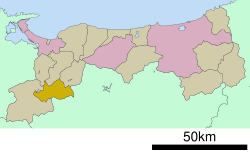Hino, Tottori
|
Hino 日野町 |
|||
|---|---|---|---|
| Town | |||

Hino Town Office, Hino, Tottori Prefecture
|
|||
|
|||
 Location of Hino in Tottori Prefecture |
|||
| Coordinates: 35°14′N 133°27′E / 35.233°N 133.450°ECoordinates: 35°14′N 133°27′E / 35.233°N 133.450°E | |||
| Country | Japan | ||
| Region |
Chūgoku San'in |
||
| Prefecture | Tottori Prefecture | ||
| District | Hino | ||
| Area | |||
| • Total | 133.98 km2 (51.73 sq mi) | ||
| Population (June 1, 2016) | |||
| • Total | 3,202 | ||
| • Density | 23,9/km2 (620/sq mi) | ||
| Time zone | Japan Standard Time (UTC+9) | ||
| City symbols | |||
| • Tree | Japanese cedar | ||
| • Flower | Azalea | ||
| • Bird | Mandarin duck | ||
| Phone number | 0859-72-0331 | ||
| Address | 101 Neu, Hino-chō, Hino-gun, Tottori-ken 689-4503 | ||
| Website | Town of Hino, Official Site(Japanese) | ||
Hino (日野町 Hino-chō?) is a town located in Hino District, Tottori Prefecture, Japan.
As of 2012, the town has an estimated population of 3,682 and a density of 27.47/km2 (71.1/sq mi). The total area is 134.02 km2 (51.75 sq mi). The town center is located around the JR West Hakubi Line Neu Station.
Hino, while located in Tottori Prefecture, also borders on Okayama Prefecture.
In the Sengoku period (1467 – 1573) the Hino clan built Kagamiyama Castle on Mount Kagami (335 metres (1,099 ft)) in the Kurosaka area of Hino. The small-scale castle consisted of only honmaru inner bailey and a ni-no-maru outer bailey. Packhorses were also kept at the castle. A jōkamachi castle town was built at the base of the mountain. In 1632 the Tottori clan destroyed the castle, and used the site as an encampment. In the Edo period (1603 – 1868) the village of Neu became a shukuba post town. The commercial and administrative activities of the present-day Hino shifted to the Neu, where they remain today.
Hino is served by the JR West Hakubi Line.
Neu Station serves the center of the town and municipal organizations.
...
Wikipedia



